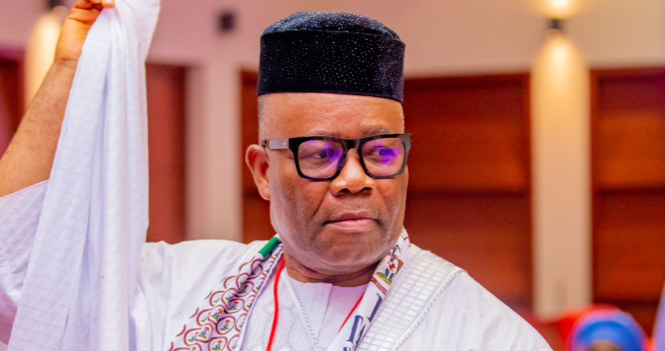The expectations of Nigerians are not only directed towards President Bola Tinubu but also towards the newly elected leadership of the National Assembly, with former uncommon Governor of Akwa-Ibom state, former Minister for Niger-Delta, and Distinguished Senator Godswill Obot Akpabio at the helm.
It is important to clarify that when we talk about the separation of powers between the executive and legislative arms of government, it does not imply that the legislature must engage in constant confrontation with the executive. Instead, in a vibrant democracy, the executive and the legislature are expected to maintain a constructive and cooperative relationship. Fortunately, Akpabio has already shown leadership and set an example in this regard. In his first week as the Senate President, we witnessed constructive and cooperative relationships between the legislature and the executive. This bodes well for the governance system and the deliverables promised to Nigerians under the Renewed Hope agenda of the president.
In a strong democracy, the Executive and the legislature operate as separate branches of government, each with its own distinct roles and responsibilities. However, they should also exercise checks and balances on each other to prevent the concentration of power and ensure accountability. Does Akpabio have the capacity to lead in this regard? The resounding answer is yes. His previous relationship with the legislature in Akwa-Ibom state when he served as governor, and the remarkable accomplishments of that administration, speak for themselves.
In terms of mutual respect and collaboration, Akpabio has checked all the boxes. His recent visit to the president to discuss the composition of Senate committees is commendable. This move aims to address the fierce competition among senators for committee chairmanships and seeks the president’s input into the committee’s composition. It demonstrates maturity in leadership, as it helps ease tensions in the National Assembly and the already tense political landscape. Nigerians must commend the Senate President for his approach.
As a journalist who has observed Akpabio’s activities from his time as governor until now, I see a man who engages in constructive dialogue, exchanges ideas, and seeks common ground to address national challenges. This approach is essential for effective leadership.
A critical aspect is legislative oversight and accountability. The legislature plays a crucial role in overseeing the actions of the Executive and holding it accountable for its policies, actions, and use of public resources. President Bola Tinubu, being a foremost democrat, recognizes and respects the oversight functions of the legislature. Providing necessary information, attending hearings, and responding to inquiries and concerns is not beyond reach.
Regarding respect for the rule of law, which is vital for a vibrant democracy, Akpabio has shown that the legislature he leads will provide a platform for robust debates and constructive criticism of the Executive’s policies and actions. This includes respecting judicial independence and complying with court rulings.
I also admire Akpabio’s skills in consensus building and compromise, demonstrated throughout the politics that led to his leadership and the selection of other principal officers. This is top-notch leadership that will help move the nation forward. Akpabio’s willingness to prioritize the national interest over partisan considerations and work towards finding common ground on key issues is exemplary and indicative of what is to come.
Based on Akpabio’s leadership roles in Akwa-Ibom and various other capacities, I am confident that he will lead an effective legislature that ensures responsive representation, especially in terms of oversight. I see a Senate President who is determined to embark on outstanding legislative reforms to make a lasting impact and etch his name in history.
There is no doubt that Akpabio will lead with legislative efficiency and promote good governance, especially under the determined administration of President Bola Tinubu. There is simply no alternative.
Regarding people-centered development projects, Akpabio is no stranger to this realm. Being referred to as an uncommon governor speaks volumes about his character and accomplishments. He has been a developmental pathfinder for Akwa-Ibom, transforming the state into what is now known as “small London” in Nigeria.
Citizens’ expectations are well-placed. They anticipate that the newly elected leadership will prioritize policies and legislation that promote inclusive and sustainable development, address social inequalities, and improve healthcare, education, infrastructure, job creation, and other essential public services that directly impact the lives of the people. Senator Akpabio has the capacity and track record to meet these demands.
Overall, citizens expect the newly elected leadership of the National Assembly to be dedicated to serving the best interests of the nation, upholding democratic values, and working towards the advancement and well-being of all citizens. With Godswill Akpabio leading the way, there is renewed hope for achieving these aspirations.
Mayaki is a developmental and multi-skilled journalist, Historian and Diplomat. He’s a Communication, Culture and Media expert (Coventry University, England). An Oxford and Cambridge University-trained entrepreneurship, leadership and sustainability expert. He’s also a Professional Consultant on Communication, Management and Strategy (Chattered Management Institute, England).
We’ve got the edge. Get real-time reports, breaking scoops, and exclusive angles delivered straight to your phone. Don’t settle for stale news. Join LEADERSHIP NEWS on WhatsApp for 24/7 updates →
Join Our WhatsApp Channel










